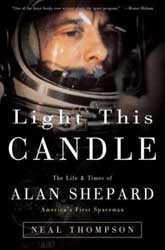
As much he was an astronaut, Alan Shepard was first a military man. Graduating from Annapolis in the closing stages of World War II, he strove to satisfy his addiction to the new fangled flying machines of his youth. Emerging as a carrier pilot then test pilot, he never flew any military missions. Nevertheless, he contributed significantly by evaluating new planes, establishing new flying techniques and extolling the life of the macho flier. Getting to be the ‘best of the best of the best’ wasn’t natural though. Thompson shows us a very troubled beginning. Shepard almost failed out of the Naval Academy, finally graduating, but, closer to the middle than the top of the class. Equally, he nearly got expelled from the navy’s flyer training program at Corpus Christi because of inadequate progress. On review, it is certainly apparent that Alan Shepard was much more a self-driven person than a natural. With a goal in target, he’d exert all his physical, emotional and sometimes devious energy to succeed, but he didn’t seem to always have a goal.
Yet, time and again Thompson shows Shepard’s determination. Descriptions of his youth show a person pushed to achieve his goals rather than receive them on a platter. Needing a bicycle to make regular visits to an airport, his parents gave him chickens to produce eggs and sell. Needing to satisfy his ambition to fly after getting medically grounded, he found a novel surgical technique to remedy his symptoms of M?ni?res’s disease. Don’t get the idea that Shepard was superhuman. Continual references show a hard drinking, womanizing, Type A personality confronting peers and superiors. Frequent instances of flat hatting demonstrate a consideration of rules as more guidelines than limits. Thompson ably shows these and the many superlatives of Shepard’s life in the event filled times in which he lived.
And as the title suggests, Thompson has an equally admirable ability to depict those times. World War II, Pearl Harbour and Okinawa stress the trials of Shepard’s pre-flight days in the navy. Background descriptions of Corsairs, landing signal officers (LSO) and night time carrier landings surround Shepard in his initiation to naval flight. Vilifications of NASA’s early days arise when engineering knowledge was slightly trailing the science and often barely a half step ahead of training. Shepard’s endeavours to sell scrub and swamp land to unknowing home buyers bring to mind catch phrases about salesmen of yor. Keep in mind that Shepard’s Redstone flight was about 15 minutes and his Apollo14 flight about 7 days, so this book, as with Shepard’s life, includes much, much more than the usual public portrayal of one of the early astronauts in the United States’ space program.
Also peppered throughout the book are references to many luminaries and dignitaries. Descriptions and undertakings of the Mercury Seven abound. Kings and queens, presidents and politicians enter and travel along with Shepard in his lifetime. Golf stories with fellow duffers and pros abound, while social evenings with dignitaries and Hollywood socialites allude to the intermingling amongst the famous. Though with fame of course comes the down side as Thompson shows how Shepard was as often a puppet for the government as a strongman propped up for the public. This unveiled view exemplifies the humanness of even this exemplary person.
A good biography places the reader like a shadow beside the subject to fabricate an image of the life and personality. Thompson does an eloquent and effective job in this with a well researched and well referenced perspective of Allan Shepard’s life and times. Though the writer’s largess might perhaps provide a bit too descriptive a narrative at times, there is no doubt as to the his take on how Shepard lived and effected the life and times of people throughout the world.
What makes a perfect astronaut? Selecting who has the right stuff to fly in space would challenge any selection process. Yet, every person is unique; imperfections and flaws blend with natural ability and desire. Alan Shepard, the second person in space and great contributor to the United States space program, had the fortune and aptitude to walk on the moon and live a very gifted and at times harrowing life. Neal Thompson presents a smooth, richly endowed biography of Shepard’s life in his book Light This Candle and through a great story, show’s that an imperfect person can become a perfect astronaut.
Read more reviews, or purchase a copy online from Amazon.com.
Review by Mark Mortimer.
